六年级英语语法 第二单元 词汇语法解析素材(2) 牛津版
- 格式:doc
- 大小:36.00 KB
- 文档页数:4
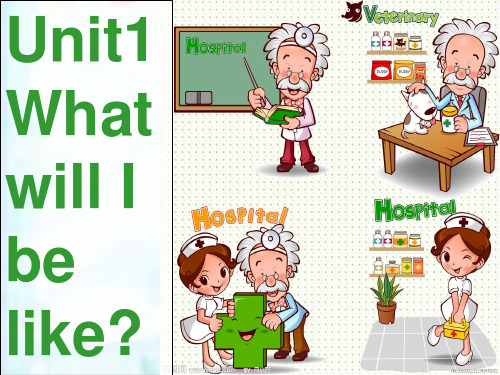
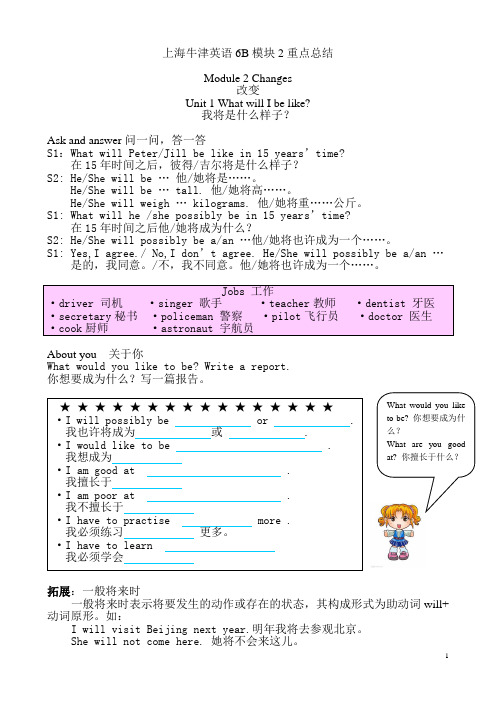
上海牛津英语6B模块2重点总结Module 2 Changes改变Unit 1 What will I be like?我将是什么样子?Ask and answer问一问,答一答S1:What will Peter/Jill be like in 15 year s’time?在15年时间之后,彼得/吉尔将是什么样子?S2: He/She will be …他/她将是……。
He/She will be … tall. 他/她将高……。
He/She will weigh … kilograms. 他/她将重……公斤。
S1: What will he /she possibly be in 15 year s’time?在15年时间之后他/她将成为什么?S2: He/She will possibly be a/an …他/她将也许成为一个……。
S1: Yes,I agree./ No,I don’t agree. He/She will possibly be a/an …是的,我同意。
/不,我不同意。
他/她将也许成为一个……。
About you关于你What would you like to be? Write a report.你想要成为什么?写一篇报告。
拓展:一般将来时一般将来时表示将要发生的动作或存在的状态,其构成形式为助动词will+动词原形。
如:I will visit Beijing next year.明年我将去参观北京。
She will not come here. 她将不会来这儿。
——Will you play football with him? 你将和他一起踢足球吗?——Yes, I will.是的,我会。
——No, I won’t. 不,我不。
拓展:奥林匹克格言(motto)的由来“更高、更快、更强(Faster, higher, stronger),是鼓励运动员(athlete)要继续不断地参加运动,努力追求进步与追求自我突破。
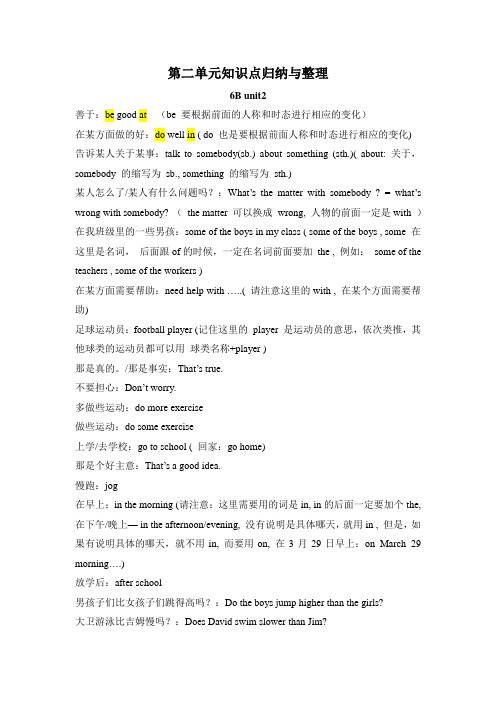
第二单元知识点归纳与整理6B unit2善于:be good at (be 要根据前面的人称和时态进行相应的变化)在某方面做的好:do well in ( do 也是要根据前面人称和时态进行相应的变化)告诉某人关于某事:talk to somebody(sb.) about something (sth.)( about: 关于,somebody 的缩写为sb., something 的缩写为sth.)某人怎么了/某人有什么问题吗?:What’s the matter with somebody ? = what’s wrong with somebody? (the matter 可以换成wrong, 人物的前面一定是with )在我班级里的一些男孩:some of the boys in my class ( some of the boys , some 在这里是名词,后面跟of的时候,一定在名词前面要加the , 例如:some of the teachers , some of the workers )在某方面需要帮助:need help with …..( 请注意这里的with , 在某个方面需要帮助)足球运动员:football player (记住这里的player 是运动员的意思,依次类推,其他球类的运动员都可以用球类名称+player )那是真的。
/那是事实:That’s true.不要担心:Don’t worry.多做些运动:do more exercise做些运动:do some exercise上学/去学校:go to school ( 回家:go home)那是个好主意:Tha t’s a good idea.慢跑:jog在早上:in the morning (请注意:这里需要用的词是in, in的后面一定要加个the, 在下午/晚上— in the afternoon/evening, 没有说明是具体哪天,就用in , 但是,如果有说明具体的哪天,就不用in, 而要用on, 在3月29日早上:on March 29 morning….)放学后:after school男孩子们比女孩子们跳得高吗?:Do the boys jump higher than the girls?大卫游泳比吉姆慢吗?:Does David swim slower than Jim?参观/游览某地:visit + 地点(参观动物园:visit the zoo)迟到:be late (你迟到了:You’re late. He’s late. We’re late.)不要迟到:Don’t be late. (这个句子是祈使句,就是给出指示或命令的句子,一般句子不用主语)我们(做什么事)好吗:Shall we …..?(shall we + 动词原形,我们开始,好吗?--- Shall we start? , 我们看电视,好吗?--- Shall we watch TV? )想,想要:would like ( would like + 名词或would like + to + 动词原形I would like a new car./ I would like to buy a new car. )我们全部:all of us请你/你们….好吗?:Would you …. please? ( would you + 动词原形,Would you leave, please? )你错了:You are wrong.干得好!:Well done!forty, horse, morning, sports [ɔ:]good/well—better, bad/ill – worse, far – farther, little/few – less, old—older, elder many/much—more。
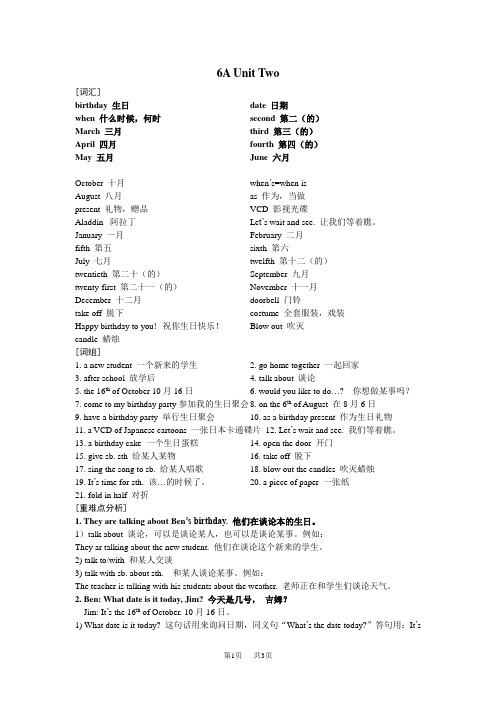
6A Unit Two[词汇]birthday 生日date 日期when 什么时候,何时second 第二(的)March 三月third 第三(的)April 四月fourth 第四(的)May 五月June 六月October 十月when’s=when isAugust 八月as 作为,当做present 礼物,赠品VCD 影视光碟Aladdin 阿拉丁Le t’s wait and see. 让我们等着瞧。
January 一月February 二月fifth 第五sixth 第六July 七月twelfth 第十二(的)twentieth 第二十(的)September 九月twenty-first 第二十一(的)November 十一月December 十二月doorbell 门铃take off 脱下costume 全套服装,戏装Happy birthday to you! 祝你生日快乐!Blow out 吹灭candle 蜡烛[词组]1. a new student 一个新来的学生2. go home together 一起回家3. after school 放学后4. talk about 谈论5. the 16th of October 10月16日6. would you like to do…? 你想做某事吗?7. come to my birthday party参加我的生日聚会 8. on the 6th of August 在8月6日9. have a birthday party 举行生日聚会10. as a birthday present 作为生日礼物11. a VCD of Japanese cartoons 一张日本卡通碟片12. Let’s wait and see. 我们等着瞧。
13. a birthday cake 一个生日蛋糕14. open the door 开门15. give sb. sth 给某人某物16. take off 脱下17. sing the song to sb. 给某人唱歌18. blow out the candles 吹灭蜡烛19. It’s time for sth. 该…的时候了。
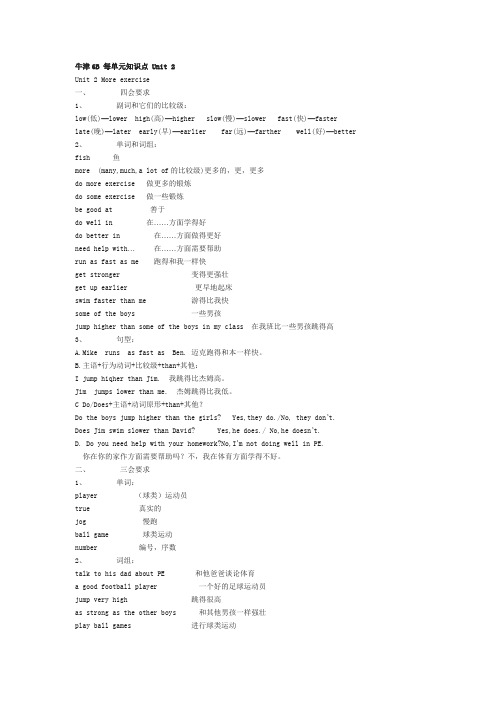
牛津6B 每单元知识点 Unit 2Unit 2 More exercise一、四会要求1、副词和它们的比较级:low(低)—lower high(高)—higher slow(慢)—slower fast(快)—faster late(晚)—later early(早)—earlier far(远)—farther well(好)—better 2、单词和词组:fish 鱼more (many,much,a lot of的比较级)更多的,更,更多do more exercise 做更多的锻炼do some exercise 做一些锻炼be good at 善于do well in 在……方面学得好do better in 在……方面做得更好need help with…在……方面需要帮助run as fast as me 跑得和我一样快get stronger 变得更强壮get up earlier 更早地起床swim faster than me 游得比我快some of the boys 一些男孩jump higher than some of the boys in my class 在我班比一些男孩跳得高3、句型:A.Mike runs as fast as Ben. 迈克跑得和本一样快。
B.主语+行为动词+比较级+than+其他:I jump hiqher than Jim. 我跳得比杰姆高。
Jim jumps lower than me. 杰姆跳得比我低。
C Do/Does+主语+动词原形+than+其他?Do the boys jump higher than the girls? Yes,they do./No, they don’t.Does Jim swim slower than David? Yes,he does./ No,he doesn’t.D. Do you need help with your homework?No,I’m not doing well in PE.你在你的家作方面需要帮助吗?不,我在体育方面学得不好。

6BU2 语法知识点讲解I. 词性转换1.fly v. 飞,飞行→ flight n. 航班e.g. Next month, they will fly to the USA. Their Flight No. is MU6789.2.depart v. 离开,出发→ departure n. 离开,启程e.g. Our parents will depart tomorrow morning. The departure time is 9.00 a.m.3. pass v. 通过→ passenger n. 乘客;旅客e.g. You can’t pass. Stop, please!All passengers must obey the rules.e.g. The arrival time is 3.00 p.m. , so they won’t arrive at 1.00 p.m.5. entrance n. 入口→ enter v. 进入 the entrance to someplaceII语言点/句型现在完成时①现在完成时:sb. have/ has + V.p.p(动词的过去分词)Sb. have/ has not V.p.p. (否定句)Have/ Has sb. V.p.p.(一般疑问句)have been to 去过,到过……(已回)have been in 住在……(+时间段) = have lived in/ stayed inhave gone to 去,到……(未回)e.g. I have been to America before. 我以前去过美国。
She has been in London for 2 years. 她已经住在伦敦两年。
Where is Mary? She has gone to the library. Mary在哪?她已经去图书馆了。
Unit 2 知识点总结【单词】famous, during, spend, everyone, countryside, pick, summer holiday, over(越过;跨过), with(和,用;带着), the Great Wall, Tian’anmen Square, the Palace Museum, Big Ben, the British Museum, photo(复数photo s)【过去式】go-went visit-visited play-played do-did watch-watchedride-rode take-took have-had enjoy-enjoyed spend-spent stay-stayed pick-picked come-came listen-listened buy-bought catch-caughtfind-found read-read meet-met sing-sang see-saw swim-swam run-ran write-wrote begin-began feel-felt fly-flew【短语】自行写上翻译went to the beach with my familywent to many famous places therevisited my grandparentsplayed ball games therewent to Beijing and visited my unclewent swimmingwent to the museumwent to the cinemadid my homeworkwatched TVvisited my friendslistened to musicin the sea在海里took a lot of photostook photosduring the summer holidaywent back to... 回到......During the summer holiday, Peter and his family went back to the UK. had a good time 玩得开心;过得愉快in the countrysidestayed with... 和......待在一起During the summer holiday, Jill stayed with her grandparents in the countryside.picked appleson holidayfly kites 放风筝【句子】1.How was your summer holiday?It was wonderful/great/good/not bad/fun. We went to the Great Wall. 2.How about your summer holiday?=What about your summer holiday? It was wonderful.3.I am now on holiday in London in the UK.【语法】1.in+城市/月份We also went to some famous parks in Beijing.In August, Alice visited her uncle in Beijing.2.sure 表示赞同。
【牛津小学英语六年级】第二单元词汇语法解析(1)Unit 2 ReadingWord box1. almost adv. 几乎We almost go to the park everyday.我们几乎每天上公园。
He almost criedwhen he was late for school.他上学迟到时几乎要哭了。
此处要重点强调的是副词的位置:副词通常用在be动词和助动词之后,行为动词之前。
2. neveradv. 从不My frien d nevergoes out at night.我的朋友晚上从不外出。
My frien d Winni e nevergets angry.我的朋友温妮从不生气。
反义词:always 总是—never从不He is neverlate for school. He is always on time. 他上学从不迟到,总是很准时。
3. otherpron. 另外人(或物),其他(或物)Kittyis always kind to others.基蒂总是对他人很友好。
My cousin Ken always talksto others in class. 我的表弟肯总是在课上与别人说话。
adj. 其他的,另外的I have some otherfrien d.我还有其他一些朋友。
I have been to some otherplaces.我已去过其他一些地方。
兼类词other既作代词,又作形容词She always helpsothers.(代词)She always helpsotherpeopl e.(形容词)注意:代词可以指代名词,如:others = otherpeople;形容词是用来修饰名词的,如:otherpeople,otherfriend,otherplaces4. each other互相Aliceand Kittyalways help each other.爱丽丝和基蒂总是互相帮助。
上海牛津英语6A重点总结Module 2 Places and activities地点和活动Unit 1 What would you like to be?你想成为什么?Ask and answer问一问,答一答S1: Would you like to be a/an…? 你想当一位…吗?S2: Yes,I would.是的,我想。
S1:Why? 为什么?S2: I’d like to be a/an…because I want to…我想当一位…,因为我想…S1: Would you like to be a/an…? 你想当一位…吗?S2: No,I wouldn’t.不,我不想。
S1: Why not? 为什么不?S2: Because I don’t like…因为我不喜欢….S1: What would you like to be? 你想当什么?S2: I would like to be a/an…我想当一位….Language语言◆Would you like to be a policeman? 你想当一位警察吗?Yes,I would.是的,我想。
No,I wouldn’t.不,我不想◆Why?为什么?Why not?为什么不?Because I want to make our city a safe place.因为我想使我们的城市成为一个安全的地方。
don’t like cooking.因为我不喜欢做饭。
◆What would you like to be? 你想当什么?I would(’d)like to be a postman.我想当一位邮递员。
拓展:1 What’s your job? 你的工作是什么?这句的同义句为What do you do?和What are you?2 make+宾语+形容词如:We should make our room clean.我们应该让房间干净。
新版译林牛津6AU2知识点和考点1.语法知识点:-一般现在时和一般过去时的用法和变化规则-疑问句和否定句的结构和变化规则-一般将来时的构成和用法- 情态动词的用法,如can, must, should等-比较级和最高级的形式和用法2.词汇知识点:-常见动词的过去式和过去分词形式-常见名词的复数形式- 常用连词和连接词,如and, but, because等-常见形容词和副词的比较级和最高级形式-常见的日常用语和短语3.阅读理解:-根据上下文推断词义和句子意义-理解文章的主题和大意-根据问题选择正确的答案-理解对话和文章中的细节信息4.听力技巧:-听懂并理解对话和文章的大意-倾听并记录关键信息和细节-根据听到的内容选择正确的答案-辨认不同音调、语气和语速的说话者-掌握一些常见的听力策略和技巧5.口语表达:-使用正确的句型和词汇进行口语表达-学会用简单的句子描述事物、表达意见和情感-学会询问问题和进行交流-掌握一些常见的口语交际用语和口头表达方式6.写作技巧:-使用正确的语法和词汇进行书面表达-学会写简单的句子和段落描述事物和经历-学会写简单的信件和日记-学会根据指导写作要求进行写作-逐渐提高写作的准确性和连贯性7.文化背景:-介绍一些英语国家的文化和风俗-学习一些英语国家的地理和历史知识-了解一些与英语语言和文化相关的名人和事件-通过阅读理解等学习材料了解不同文化之间的差异和相似之处以上只是可能的知识点和考点总结,实际教材可能还有其他内容。
学生在学习时,应该根据教材的具体要求和教师的指导进行有针对性的学习和复习。
Unit 2 Reading:Friends of the Earth
Word box
1. Earth n. 地球
What do Friends of the Earth do?
地球之友的成员们做什么?
2. look after照顾,照看
Mum looks after us very well.
妈妈把我们照顾得很好。
3. environment n. 环境
The environment is all the things round us.
环境就是我们周围所有的东西。
4. pollute v. 污染
Sometimes people pollute the environment.
有时人污染环境。
Don’t pollute the air.
不要污染空气。
5. pollution n. 污染
We have air pollution, water pollution and land pollution.
我们有空气污染,水污染和土地污染。
6. land n. 陆地,土地
We don’t have enough land here.
我们没有足够的土地。
7. keep v. 保持
We must pick up rubbish and keep our city clean. 我们必须捡起垃圾,保持城市清洁。
8. pick up捡起,拾起
They pick up rubbish.
他们把垃圾捡了起来。
9. into prep. 到。
里面
Put rubbish into rubbish bins.
把垃圾丢进垃圾箱中。
10. rubbish bin n. 垃圾箱
Put rubbish into rubbish bins.
把垃圾丢进垃圾箱中。
11. leave v. 留下
They tell people not to leave rubbish.
他们告诉人们不要丢垃圾。
12. promise v. 承诺,保证 n. 诺言
We promise not to pollute the air.
我们承诺不污染空气。
We have a promise.
我们有一个承诺。
13. discuss v. 讨论
Let’s discuss in groups.
让我们进行小组讨论。
14. reuse v. 再利用
We promise to reuse shopping bags.
我们承诺要再利用购物袋。
Language focus
1. I promise to keep our school clean.
(1)promise to do
承诺去做某事
(2)promise not to do
承诺不去做某事
(3)keep our school clean
保持我们的学校清洁
keep sth +adj 保持。
处于某状态keep the environment clean
keep the food fresh
keep the city safe
2. pollute the environment
3. air pollution
4. water pollution
5. land pollution
6. pick up rubbish
7. put rubbish into rubbish bins
8. tell sb to do / tell sb not to do
9. tell people not to leave rubbish。